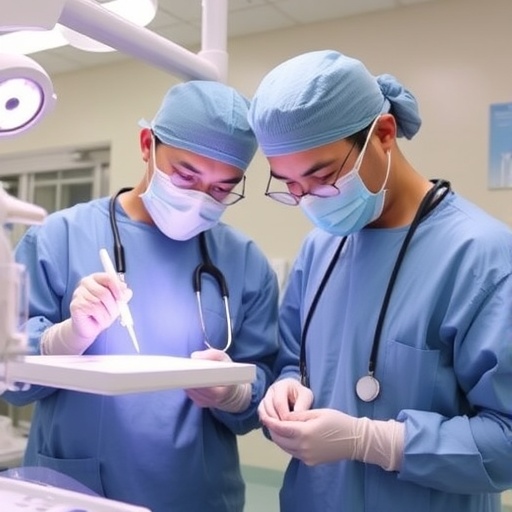Emerging evidence from a recent observational study conducted at a prominent Japanese medical center underscores the critical role of preoperative oral care in reducing postoperative infections and improving overall surgical outcomes. This retrospective analysis evaluated the impact of structured oral hygiene interventions initiated at least two weeks prior to surgery, revealing a noteworthy association with decreased incidences of postoperative pneumonia and shortened hospital stays. These findings emphasize the often-overlooked significance of oral health in surgical patient management and its potential to mitigate infectious complications that can compromise recovery trajectories.
Surgical site infections and respiratory complications remain substantial challenges in perioperative care, contributing to prolonged hospitalizations, increased healthcare costs, and elevated morbidity and mortality rates. While conventional infection control measures typically focus on intraoperative asepsis and postoperative wound care, this study highlights the importance of preoperative interventions targeting the oral microbiome. The oral cavity serves as a reservoir for pathogenic microorganisms that can colonize the respiratory tract and surgical wounds, potentially triggering secondary infections. As such, preemptive oral hygiene optimization may disrupt pathogen transmission pathways, thereby diminishing postoperative infectious risk.
The study’s methodology entailed a comprehensive retrospective review of patient records, distinguishing cohorts based on whether they received planned preoperative oral care interventions at least two weeks before surgery. These interventions included professional dental evaluations, plaque removal, management of periodontal disease, and patient education on maintaining optimal oral hygiene. The timeline was designed to allow sufficient duration for microbial biofilm reduction and mucosal healing, potentially maximizing immunological benefits before the surgical insult.
Statistical analyses illuminated a significant reduction in postoperative pneumonia rates among patients who underwent preoperative oral care compared to those who did not. Such a finding is particularly salient given pneumonia’s status as a leading cause of postoperative morbidity after major surgeries, especially pulmonary and cardiac procedures. The attenuated infection rates point toward oral care’s efficacy in altering microbial colonization and enhancing mucosal defense mechanisms against opportunistic pathogens.
Moreover, the study documented a marked decrease in the average length of hospital stay for patients receiving preoperative oral interventions. Shorter hospitalizations not only reflect fewer postoperative complications but also translate to reduced economic burden on healthcare systems and diminished nosocomial infection risks inherent to protracted inpatient care. These benefits collectively underscore the pragmatic advantages of integrating oral hygiene protocols into pre-surgical preparation routines.
Mechanistically, the benefits of oral care extend beyond mechanical plaque removal. Professional dental interventions can reduce inflammatory mediators implicated in systemic immune activation, potentially moderating perioperative immunosuppression. Additionally, improvements in oral mucosal integrity may hinder bacterial translocation into systemic circulation. This comprehensive modulation of oral and systemic environments could thereby optimize host resilience during the critical perioperative period.
While this study’s single-center, retrospective nature necessitates cautious generalization, its implications are far-reaching. By reinforcing the tangible benefits of planned preoperative oral care, it advocates for multidisciplinary collaboration between surgeons, anesthesiologists, and dental professionals to incorporate oral health assessments into preoperative evaluations. Such integrative care models promise enhanced patient safety and improved surgical outcomes.
Interestingly, the absence of specific funding and declared conflicts of interest in this research contributes to the credibility and impartiality of its findings. It positions the work as an independent contribution to the evolving understanding of perioperative infection control paradigms. Future prospective, multicenter trials will undoubtedly be instrumental in validating and refining oral care protocols within diverse surgical populations.
Given the complexity of postoperative infectious pathophysiology, the integration of preoperative oral hygiene offers a non-invasive, cost-effective strategy that complements existing infection prevention measures. This holistic approach aligns with growing recognition of the oral-systemic health connection and its ramifications for comprehensive patient care.
In the context of an aging global population with increasing surgical demands, mitigating infection-related complications through accessible interventions like oral care assumes heightened importance. Implementation challenges, including patient adherence and resource allocation, warrant systematic investigation, yet the potential benefits are compelling enough to warrant clinical adoption.
This research heralds a paradigm shift that situates oral health at the forefront of surgical risk management. By prioritizing oral microbial ecology before operative stress, clinicians may substantially reduce infection-related morbidity, enhance recovery, and achieve healthier patient trajectories.
As the medical community continues to unravel the interconnectedness of oral and systemic health, this study offers robust empirical support for revisiting and expanding preoperative care standards. It invites heightened awareness and proactive strategies that leverage oral hygiene as an indispensable adjunct in the fight against postoperative infections.
In summary, the compelling data from this Japanese hospital-based study affirms that planned preoperative oral care administered well in advance of surgery is strongly linked with reduced postoperative pneumonia incidence and abbreviated hospital stays. These findings advocate for broader clinical integration of oral health optimization as a critical component of surgical preparatory regimens, potentially transforming patient outcomes and healthcare quality on a global scale.
Subject of Research: Impact of preoperative oral care on postoperative infections in surgical patients
Article Title: Effect of planned preoperative oral care implemented at least 2 weeks before surgery on postoperative infections: A single-center retrospective observational study
News Publication Date: 3-Sep-2025
Web References: http://dx.doi.org/10.1371/journal.pone.0330165
Image Credits: Furuta et al., CC-BY 4.0 (https://mediasvc.eurekalert.org/Api/v1/Multimedia/363c4371-0e4d-428d-958f-e9ce6d24c2f1/Rendition/low-res/Content/Public)
Keywords: Preoperative oral care; postoperative infections; pneumonia; surgical outcomes; oral hygiene; infection control; microbiome; perioperative care




